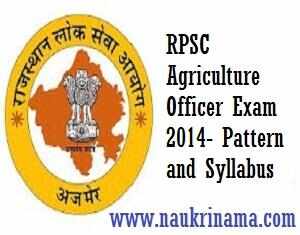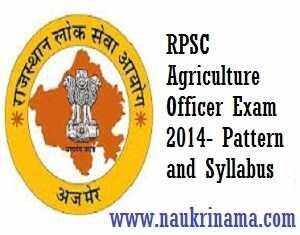RPSC Agriculture Officer Exam 2014- Pattern and Syllabus


Agriculture Officer is a person, who have full-fledged knowledge of farmers and farming fields. He keeps in touch with farmers. He grants loan to farmers.
Rajasthan Public Service Commission release the Syllabus and Exam Pattern for Agriculture Officer Exam, 2014. Check the details given below.
RPSC Agriculture Officer Exam 2014- Pattern and Syllabus
Name of Organization: Rajasthan Public Service Commission
Name Of Post: Agriculture Officer
Total Post: 257
Exam Pattern of Question Papers:-
1 Objective Type Paper.
2 Maximum Marks : 360
3 Number of Questions : 120
4 Duration of Paper : Two Hours.
5 All Questions carry equal marks.
6 There will be Negative Marking.
Syllabus for Agriculture Officer:-
Syllabus of each Paper is given below in detail:-
Paper-I:-
General Hindi:- Questions will be ask from Hindi Grammar, Antonym Synonym, Difference between word pairs, Sentence Correction, One Word Substitution, Idioms & Phrases.
General Knowledge, History & Culture Of Rajasthan:- Questions are designed to check candidate’s knowledge about Geography, History, cultures, eminent personalities of Rajasthan, Contribution of Rajasthan in Indian Freedom Movement, Agriculture, Languages, Festivals, Tribes, Art, Religious & historical places of Rajasthan.
Paper-II (Agriculture):-
Agro-climatic zones of Rajasthan, Elements of crop production and effect on plant growth. Importance of weather forecasting, aerospace and remote sensing. Precision farming. Plant nutrients – functions and deficiency symptoms, soil reaction and bio-fertilizer, interaction, sources. Role of Organic manures, fertilizers and bio-fertilizers, integrated nutrient management.
Role of farm forestry in soil and water conservation, silviculture, compatibility of crops, problems of seed germination etc. Appraisal of economics of farm forestry. Common herbicides and their uses in important grain crops, oils seeds, pulses and fibre crops, forage and grass land and consequences of their use.
Soil classification and soil survey, soils of Rajasthan, soil physics-physical properties, moisture, air temperature. Physical chemistry of soil-colloids, soil reactions. Soil microbiology- organic matter, Humus function, structure, formation, C/N ratio, symbiotic and non-symbiotic nitrogen fixation.
Olericulture – Classification of vegetables, nursery, transplantation, seed testing and storage, cultivation practice of cauliflower, cabbage, chillies, brinjal, carrot, radish, onion, pea, okra, muskmelon, watermelon and sweet potato. Different styles of gardening-indoor out door etc. layout care and maintenance, cultivation of major cut flowers like Rose, Gladialus, Tubrose and Chrysanthemum.
Pomology- layout of orchards, propagation methods, cultivation of mango, citrus, banana, guava, pomegranate, grapes, papaya, ber, phalsa, aonla, datepalm, Post harvest losses and Principles of fruits and vegetable preservation, dehydration, bottling, canning. Insect pests spectrum in Rajasthan. Assessment of crop losses and their implication in pest management.
Essential plant nutrients and their role, major and micronutrients. Methods of Plant Breeding for self and cross pollinated crops, concept of heterosis, type of hybrids, Combining ability, DNA recombinant technology, transgenic crops and their scope, seed testing, type of seeds, seed certification standards for different crops.
Importance of livestock and poultry in Indian economy: Origin, distribution and main characteristics of INDIAN and EXOTIC Breeds of cow, buffalo, goat, sheep and poultry. Prevention & control of common infectious & contagious diseases of livestock and poultry. Feed stuff and their classification. Determination of nutritive value of feed, balanced ration.
Preservation of forages, common grasses, grass land and their management. Artificial insemination – merits, demerits, collection evaluation, dilution, preservation and storage of semen., Systems of inbreeding and out breeding, breeding value and its estimation. Heritability, repeatability.
Limnology – water science, physic chemical and biological properties of water, late-ecosystem, water pollution and various types of water bodies. Fish morphology and anatomy, osmoregulation, respiration in fish. Different types of aquaculture systems and fisheries.
Philosophy and principles of extension education rural social institutions, caste and family, rural leadership, teaching learning process, audio-visual aids, teaching methods, programme planning and evaluation communication process, media of communication Diffusion theory history of extension programme in India. CD, NATP, ATIC, HYVP, NAIP, MREGA, IRDP, PRA, PMRY, SGSY, JRY, ATMA, KVK, Panchayati Raj, IVLP, T&V system, ADP, motivation, cooperative societies and voluntary organizations, Adult education and National Literacy Mission.
CLICK HERE: RPSC Agriculture Officer Syllabus and Exam Pattern 2014
You Can also follow the steps given below:-
- Visit the Official Website.
- Click on “Updated on 20/11/2015” Under Syllabus.
- Click on “Download Link” Under Syllabus Section.
- You will get the Syllabus for Agriculture Officer.
See: RPSC Recruitment 2015 for 13,355 Posts of Lecturer/ Agriculture Officer
To View Rajasthan Govt Jobs click here
To View More Syllabus click here
For Official Website: CLICK HERE
